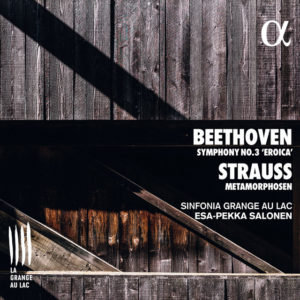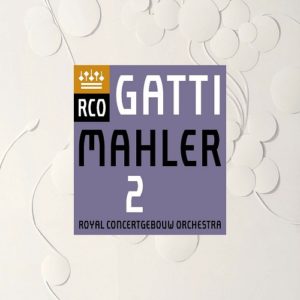GRAMOPHONE Review: Beethoven Symphony No. 3 / Strauss Metamorphosen – Sinfonia Grange au Lac/Salonen
 The intriguingly named Sinfonia Grange Au Lac (literally The Barn on the Lake) bows in here under its first mentor and incumbent Esa-Pekka Salonen. A unique custom made orchestra for a custom made venue and festival – Recontres Musicales d’Évian – nestling in a forest a stone’s throw from Lake Geneva. Furthermore, Salonen’s pairing of these obliquely connected works shrewdly suggests a spirit of regeneration born of the elements.
The intriguingly named Sinfonia Grange Au Lac (literally The Barn on the Lake) bows in here under its first mentor and incumbent Esa-Pekka Salonen. A unique custom made orchestra for a custom made venue and festival – Recontres Musicales d’Évian – nestling in a forest a stone’s throw from Lake Geneva. Furthermore, Salonen’s pairing of these obliquely connected works shrewdly suggests a spirit of regeneration born of the elements.
Strauss’ Metamorphosen for 23 solo strings mourns loss and destruction whilst signalling rebirth from the ruins of Naziism and conflict – and its profuse polyphony chimes with the ethos of this fledgling orchestra as its individual talents seek unity and a collective identity. The playing communicates a communal generosity but better yet a sense of first-time spontaneity. It sounds very up close and personal and the warm, woody sound of the venue feels at one with the music.
And then, of course, Strauss quotes from the marche funebre of Beethoven’s Eroica in the latter stages of the piece directly connecting us to the universal monument that follows – a piece entirely about defiance and renewal. Salonen and his young players are punchy and vital in it – bags of sinew and an unvarnished tone throughout.
Harder timpani sticks and more assertive trumpets would have conveyed more of an elemental (period) feel and at times the sound of the band is a touch opaque given the immediacy of the acoustic. Would that all of the first movement motored at the same level of intensity as the coda. The surge of energy there does not feel as accumulative as it might.
A sense of deja vu then pulls our emotions back to the Strauss at once validating the coupling – and I do like the way in which the central fugue is possessed of a craggy defiance with that ensuing plunge of string basses into the abyss feeling less expected and less ‘knowing’ than it sometimes does. Similarly the scherzo and finale feel freshly encountered, the variations of the latter still suggestive of inquisitive performers.
I won’t pretend that this account of the Eroica (or indeed the Strauss) is especially competitive given the many great performances we can now choose from – not at all. But in a sense this disc is its own ‘occasion’ with its own atmosphere and that has to count for something.
You May Also Like

A Conversation With DAME JANET BAKER
25/12/2014
A Conversation With PAUL KERRYSON: ‘The Light in the Piazza’
02/09/2010

